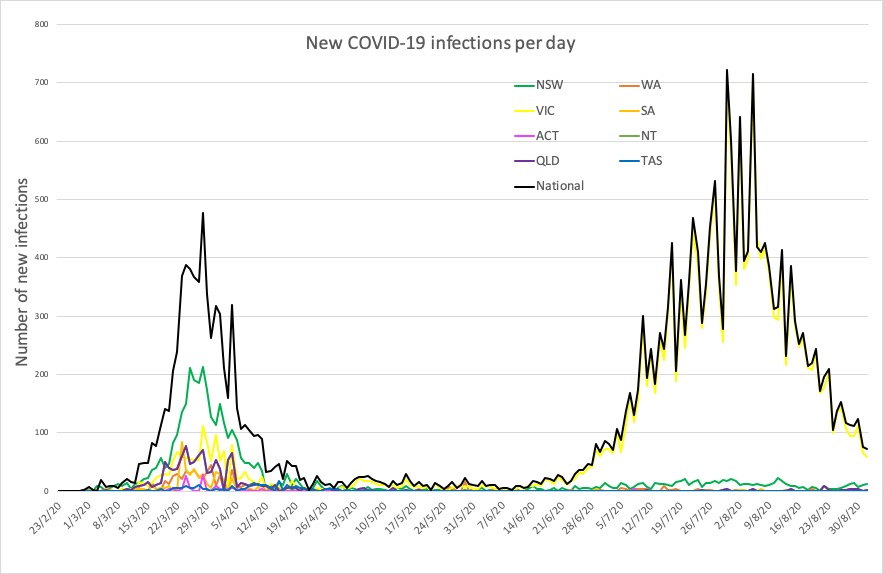Australians are second only to the Danish in their approval of how their country has handled the COVID-19 crisis.
Welcome to The Medical Republic‘s COVID Catch-Up.
It’s the day’s COVID-19 news into one convenient post. Email bianca@biancanogrady.com with any tips, comments or feedback.
2 September
- Australians overwhelmingly think the nation has done a good job handling COVID-19, survey finds.
- Pregnancy and COVID-19 raises odds of intensive care admission and preterm birth.
- Study of COVID-19 transmission on board a bus supports airborne transmission.
- Latest confirmed COVID-19 infection numbers from around Australia.
- Australians are second only to the Danish in their approval of how their country has handled the COVID-19 crisis, according to a Pew Research Center survey of 14 high-income countries.
Pew surveyed 14,276 adults, between June 10 and August 3, 2020, from nations including Australia, France, US, UK, Japan, South Korea and Germany. This revealed that 94% of Australians surveyed felt that Australia had responded well to the pandemic, compared to 95% of Danish, 71% of Swedes, 47% of US residents and just 46% of those in the UK.
More than half of Australians say the pandemic hasn’t changed their life much or at all, compared to 19% of South Koreans, 73% of Danes and around one-third of UK residents. In all the nations surveyed, women were more likely than men to report that their lives had changed a great deal with COVID-19; in Australia, 42% of men said their life had changed a great deal or fair amount, compared to 52% of women.
The pandemic has also contributed to a more divided society, particularly in the US where 77% of respondents felt their country was more divided than before COVID-19. Forty percent of Australians felt Australia was more divided now compared to before COVID-19, but 54% said it was more united.
“In every country surveyed, those who think their country has done a bad job of dealing with the coronavirus outbreak are more likely to say that their country is now more divided,” the authors wrote. - Pregnant or recently pregnant women with COVID-19 are less likely to present with fever or muscle aches, but more likely to end up in intensive care, than non-pregnant women of similar age.
A systematic review and meta-analysis, published in the BMJ, examined 77 cohort studies of COVID-19 in pregnant or recently pregnant women. This revealed that pregnant or recently pregnant women were significantly less likely to have COVID-19 symptoms of fever or myalgia, but significantly more likely to have a history of diabetes compared to non-pregnant women.
Pregnancy or recent pregnancy was associated with a 62% higher odds of admission to intensive care and 88% higher odds of needing invasive ventilation than in non-pregnant women. High BMI and pre-existing comorbidities were also associated with a higher likelihood of admission to intensive care and needing mechanical ventilation.
COVID-19 infection was associated with a higher odds of preterm birth, but no significant effects were seen for other pregnancy outcomes. - The spread of COVID-19 from a single passenger aboard a bus suggests that those further away had a similar risk of exposure as those sitting close to the infected individual.
A study published in JAMA Internal Medicine looked at two buses carrying 128 people on a 100-minute round trip to a 150-minute religious gathering. A single passenger on bus 2 was later confirmed to have been SARS-CoV-2-positive, but by the end of the entire event, 24 individuals had been infected with COVID-19, all of whom were on the bus carrying the index case. A further seven cases were reported among 172 individuals who attended the religious event and described being in close contact with the index patient, but did not travel on either bus.
The bus that carried 68 passengers, including the index case, had 15 rows of seats, circulated air, and openable windows. Researchers found the secondary positive cases were scattered around the bus, and moderately – but non-significantly – higher risk seen in those sitting closer compared to those sitting further away.
The authors said their study provided further evidence of aerosol transmission of COVID-19 over long distances.
“If COVID-19 transmission occurred solely through close contact or respiratory droplets during this outbreak, the risk of COVID-19 would likely be associated with distance from the index patient, and high-risk zones on the bus would have more infected cases,” they wrote. - Here are the latest confirmed COVID-19 infection numbers from around Australia to 9pm Tuesday:
National – 25,819, with 657 deaths
ACT – 113 (0)
NSW – 4063 (13)
NT – 33 (0)
QLD – 1124 (2)
SA – 463 (0)
TAS – 230 (0)
VIC – 19,138 (70)
WA – 655 (0)



